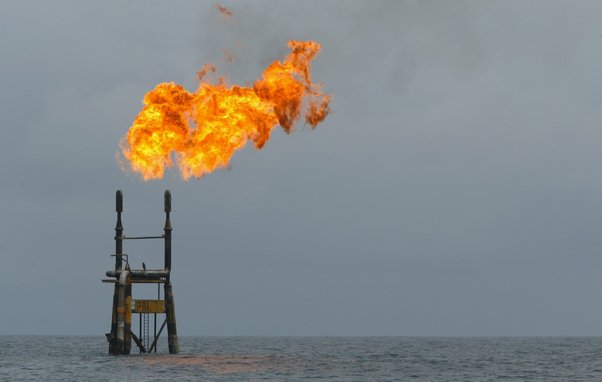As a UN expert panel highlights the need to cancel new fossil fuel projects, the world’s largest oil and gas companies are projected to spend over $930 billion on new developments - despite claims to support global climate targets.
For over three decades, the United Nations’ International Panel on Climate Change (IPCC) has synthesised scientific evidence and set alarm bells ringing. Two years into the critical decade for climate action, its most recent report concludes that “without immediate and deep emissions reductions limiting global warming to 1.5 °C is beyond reach”.
Yet, fossil fuel companies that publicly support the temperature goal are projected to spend the next nine years pumping $932 billion into new oil and gas developments. At a time when the UN Secretary General calls investments in new fossil fuel infrastructure “moral and economic madness”.
Some government and business leaders are saying one thing and doing another. Simply put, they are lying.
Hypocrites at work
Global Witness and Oil Change International analysed data by Rystad Energy that projects investments of the world’s 20 largest fossil fuel producers that claim to support the Paris Climate Agreement. If these corporations were serious about aiming to limit global warming to 1.5°C, as world leaders set out in 2015, they would need to have ceased all investments in new oil and gas projects.
In fact, the IPCC report laid out this week that the world needs to use “far less fossil fuel than today”. In addition, they said “without early retirements, or reductions in utilisation, the current fossil infrastructure will emit more [greenhouse gas emissions] than is compatible with limiting warming to 1.5°C."
This is not new. The IPCC does not produce original research but summarises the state of climate science. Researchers, civil society organisations and the International Energy Agency have all called for a stop on new fossil fuel developments.
However, despite affirming the goals of the Paris Agreement, private companies like Shell, Chevron, Eni and ExxonMobil seem to be banking on a future where polluting fossil fuels continue to be profitable. The same holds for majority state-owned companies whose governments have signed the agreement themselves, such as Russia’s Gazprom, Saudi Aramco, PetroChina and Norway’s Equinor.
Based on projections by the industry analyst Rystad Energy, the 20 largest oil and gas companies are expected to invest $932 billion in developing new oil and gas fields - in just 9 years. By the end of 2040 the figure grows to a staggering $1.5 trillion.
This is projected expenditure on exploring new oil and gas fields that have already been discovered and developing those fields to a state where they are ready for oil and gas production.
Gazprom makes up almost a third of projected investments in new fossil gas by 2030, with France’s TotalEnergies and Britain’s Shell among the top five investors. Both have highly publicised net-zero plans to limit global warming and Total changed its name to signal a shift towards more climate-friendly energy sources. Yet, Rystad data shows that combined, both are expected to spend more than $60 billion on developing new fossil gas projects.
Tellingly, Total says that “gas – the least carbon-intensive fossil fuel – is one of the solutions available for combating global warming while providing the world with the energy it needs.”
Industry misinformation about gas is commonplace: Analysis by Oil Change International published in 2020 showed that the oil and gas majors are not honest about the high greenhouse gas emissions of fossil gas – the third most carbon intensive fuel available. Instead of ramping up production of gas as a supposed bridge fuel, global supply needs to decline by 40% by the end of the decade to keep a chance of limiting warming to 1.5°C. Failing to act will lead to the dystopian world Guterres described; “Major cities under water. Unprecedented heat waves. Terrifying storms. Widespread water shortages. The extinction of millions of species of plants and animals.”
In spite of this, Rystad projects three US companies alone – ExxonMobil, Chevron and ConocoPhillips – to collectively invest over $173 billion by the end of 2030 in developing and discovering new oil fields.
While American companies are not currently prohibited from pushing billions into new oil and gas infrastructure, the “moral and economic madness” certainly extends beyond corporations.
In March, US President Biden partnered with Europe’s Ursula von der Leyen “to support final investment decisions on both LNG export and import infrastructure”. In a joint statement on European energy security, they claim to “understand that the rapid transition to clean energy is essential to advancing European independence from Russian gas and [that they] are committed to the goals of the Paris Agreement.” But independence from Russian gas does not and must not justify more fossil fuel projects in the US or in Europe.
The IPCC’s assessment found a projected risk of $1-4 trillion in stranded fossil fuel assets by 2050 if governments limit warming to 2°C, higher if warming is limited to 1.5°C. This risk should not be offloaded to European and American taxpayers, especially as there is no need for new fossil fuel infrastructure to fully substitute Russian gas supply to Europe.
High emitting governments and corporations are not just turning a blind eye; they are adding fuel to the fire. They are choking our planet, based on their vested interests and historic investments in fossil fuels, when cheaper renewable solutions provide green jobs, energy security and greater price stability.
We asked Gazprom, ExxonMobil, Chevron, ConocoPhillips, Shell and TotalEnergies to comment on our findings.
ExxonMobil highlighted its “$15 billion investments in lower-emissions technologies”, pointed out the International Energy Agency’s net-zero scenario which modelled approximately $11tn investments in oil and gas development to meet energy demand and explained that “based on currently anticipated production schedules, a substantial majority of ExxonMobil’s year-end 2021 proved reserves are expected to have been produced by 2050.”
Chevron commented on their plans to reduce the “carbon intensity” of the oil and gas they produce and “profitable, lower carbon new energy businesses that leverage our strengths”.
ConocoPhillips pointed to their plan for the “net zero energy transition” which addresses the carbon intensity of their products and opportunities for the company to invest in carbon capture, hydrogen and offsets but rejects targets that would reduce their production.
TotalEnergies commented that they expected to spend around $12.8bn investing in “greenfield and exploration” projects between 2022 and 2026 and they believe Rystad’s projections to be an overestimate adding that they have objectives for developing renewables and electricity production.
Gazprom and Shell did not respond.
Credit where credit is due?
Interestingly, 2022 saw some of the fossil fuel companies above speaking out against human rights violations. Companies like Shell, Equinor, ExxonMobil and BP withdrew or paused operations in Russia as a response to Putin’s war on Ukraine. Earlier in the year, Chevron and Total left the Yadana fossil gas project in Myanmar, with Total citing “the abuses and human rights violations taking place”. When dropping their share in Russia’s gas company Rosneft, BP announced that they were “looking at how BP could support the wider humanitarian effort”.
However, an industry that only leaves Russia after 7 years of war in Ukraine and whilst continuing operations in authoritarian and warmongering regimes elsewhere does not deserve praise. Why does their solidarity not extend, for instance, to the people of Yemen and cause rupture with the Saudi Arabian regime?
Instead of applauding the Western fossil fuel industry’s belated exit from Russia, let us give credit to the sector for the deadly impacts of climate change. 89% of global carbon dioxide emissions come from fossil fuel combustion and industrial processes.
Their investment behaviour suggests that such companies are banking on our collective failure to meet the Paris climate targets – targets that seek to protect billions from increasingly lethal climate extremes.
Researchers link climate change to 5 million excess deaths per year. And in March, the IPCC established that climate change induced weather extremes have already “exposed millions of people to acute food and water insecurity, especially in Africa, Asia, Central and South America, on Small Islands and in the Arctic.” The use of fossil fuels is the primary driver of this suffering.
The fact that fossil fuel companies have moved to affirming global climate goals while simultaneously investing in prolonged fossil fuel extraction is a macabre attempt at gaslighting the public. It fits well into the playbook of the past decades. Harvard-based science historian Naomi Oreskes explains that the oil and gas industry: “responded by lying about the danger of their products, blunting public awareness, and lobbying against government action. The result is today’s climate emergency.”
Linking climate change and the war in Ukraine, Svitlana Krakovska, the country’s chief climate scientist, said “the roots of both these threats to humanity are found in fossil fuels.” Today, the International Criminal Court investigates potential crimes against humanity in Ukraine. In 2019, the UN Special Rapporteur on Human Rights and the Environment confirmed what millions are experiencing every day: “Climate change is already harming billions of people, violating human rights, exacerbating inequality and perpetuating injustice.”
Let us confront the industry that finances and profits from the suffering of billions.
In line with the IPCC’s assessment, governments and investors across the world need to stop funding new oil and gas developments immediately. They need to ensure the fossil fuel industry goes into a managed decline that aligns with the Paris Agreement’s ambition to limit global temperature rise to 1.5°C. There is zero space or need for new oil and gas – even if Russia’s fossil fuels are fully embargoed. Let’s stop this madness.


